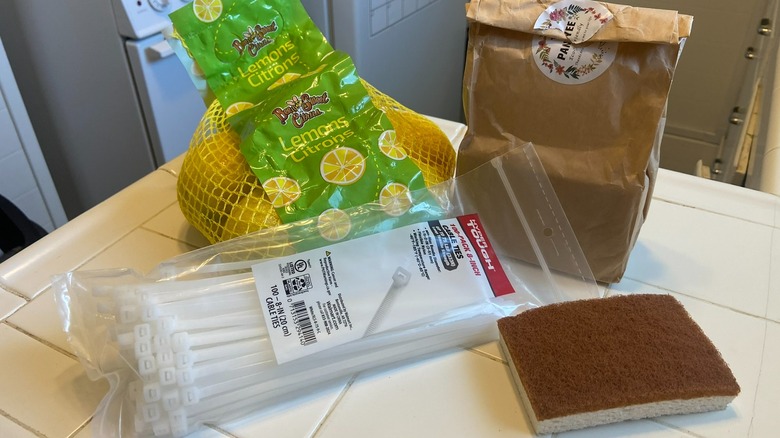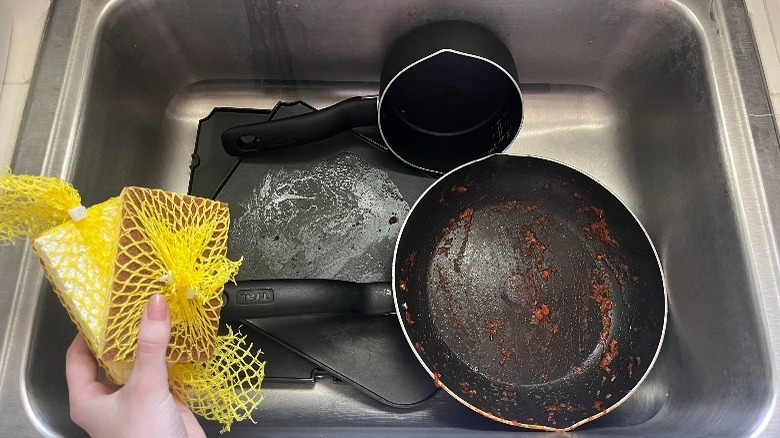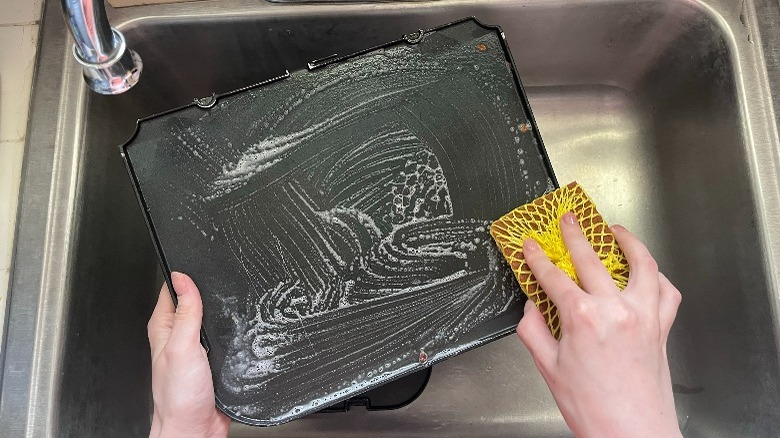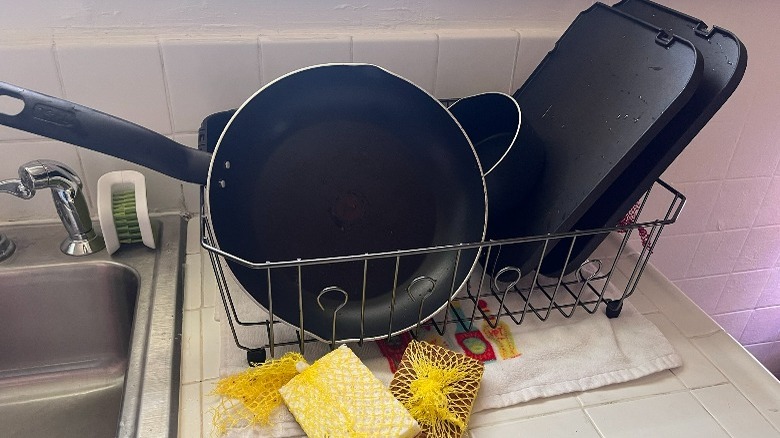We Tried A Mesh Produce Bag As A Pot Scrubber With Clean, Eco-Friendly Results
We may receive a commission on purchases made from links.
Over the years, we've put in some good work to cut down on the waste we accumulate from the grocery store. We've switched to reusable or paper bags at check out, skipped the single-use plastic bags in the produce section, and even tried buying in bulk when possible. However, there is still much waste that can come from a single grocery trip. One thing we noticed constantly going in the trash was mesh produce bags that typically hold avocados, stew potatoes, and lemons. This got us wondering how we could repurpose the mesh to give it a second life, and thankfully, there are many ideas.
One is the DIY dish scrubber. Likely, you already have most of what you need on hand. With the help of an old sponge and a couple of cable ties, you can create an inexpensive scrubbing pad in just a few minutes. Of course, most store-bought pot scrubbers cost less than $5 at most stores. But still, with a large bag of zip ties and a hoard of mesh bags from previous grocery trips, you can make countless recycled sponges for cheap or free!
Preparing our DIY sponges
As mentioned previously, you'll need three things for this craft. We bought a 2-pound bag of lemons and a 100-count package of Hyper Tough 8-inch cable ties for nearly $7 from Walmart. Already on hand, we also had several leftover PANYEE plant-based sponges from Amazon. However, any old sponge will work for this DIY.
To set up our experiment, we began by making our pot scrubbers on our kitchen counter. The mesh bag from our lemons was large, so we cut it into two equal parts to make two sponges with two tying methods. For our first sponge, we wrapped it candy-style, folding the mesh over to create two loose ends on the shorter edge of the scrubber. Then we used our zip ties to secure the length on each side and cut them to fit. Then, to create our second scrub pad, we wrapped the mesh around the sponge with the ends meeting in the center. We tied it together at the top twice with two cable ties, threading them through some of the holes to make sure it was secure. To test the sponges, we experimented on a small pot we used for making pasta, a pan covered with dried spaghetti meat sauce, and two non-stick plates from our panini press dirtied with cooked ham and muenster cheese. We simply tried out the hack in our apartment's small stainless steel sink using Dawn dish soap, which worked perfectly for the test.
Our initial thoughts on the mesh sponge experiment
Putting together our pot scrubbers was simple. Our only trouble was how messy the process ended up being. As we cut through the bag and pulled off the sticker, tiny yellow shreds fell onto the counter and floor. Afterward, we swept them up and threw them away, but the small pieces of plastic could become dangerous for babies and small animals hanging out nearby.
Though we only used two methods of tying the mesh to the sponges, there could be many other ways you can do it to fit your needs. Between the two we made, however, we preferred the knot-the-top method over the candy-wrapped scrubber, which occasionally scratched the pans due to the cable ties' placement. This could be avoided by securing the mesh with a soft yarn or knotting the ends of the mesh bag. During the dishwashing process itself, we encountered very few pitfalls. Despite lightly scraping the surface of the dishes with the sharp plastic ties, the rest of the scrubber worked perfectly. We're shocked at how easily the mesh bag and sponge loosened caked-on food and grease.
How the pot scrubbers really performed
The results of our experiment were fairly straightforward. Our DIY scrubbers took less than five minutes to make, all of our materials were inexpensive or free, and they held up well during the test. Considering the effort, cost, and benefits of recycling common grocery store waste, we think using mesh produce bags as a pot scrubber is a win!
After scrubbing our non-stick pan, pot, and two panini press plates, they looked nice and clean without any leftover residue. Of course, this pot-scrubbing hack doesn't necessarily speed up the process of cleaning your cookware, but it doesn't slow it down either. The scrub pads managed to make our dishes shine in about the same amount of time that it normally takes to wash our pots and pans. We honestly didn't notice much of a difference between these DIY scrubber sponges and the ones we've tried from grocery stores in the past. Once they were washed and rinsed, we set the cookware in our dish rack to dry and then texted all of our friends about this simple yet effective cleaning trick.



